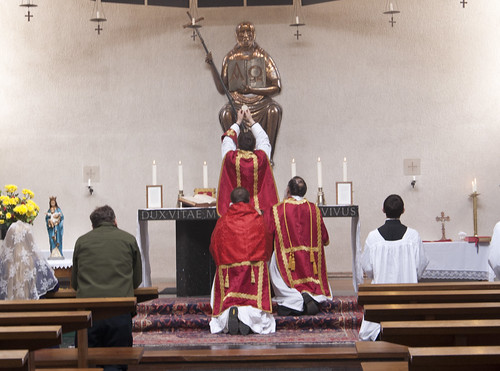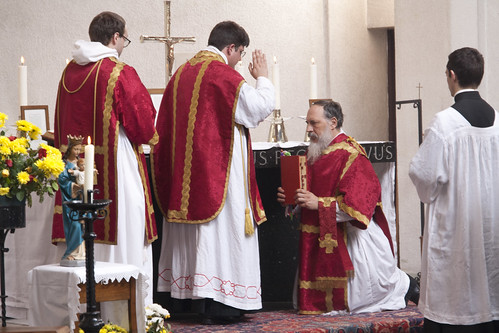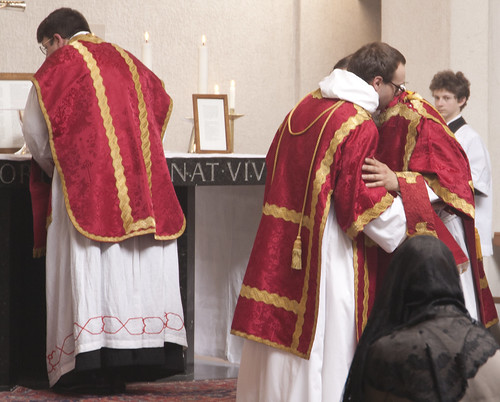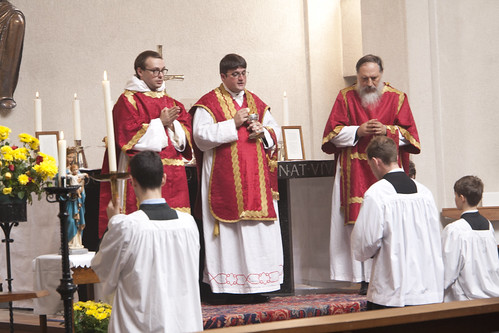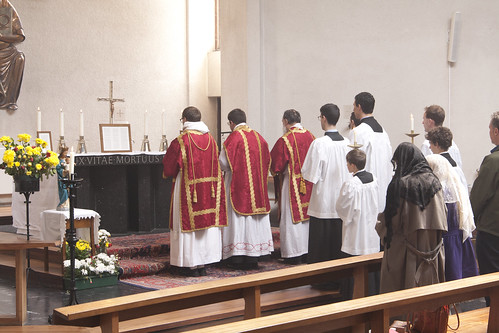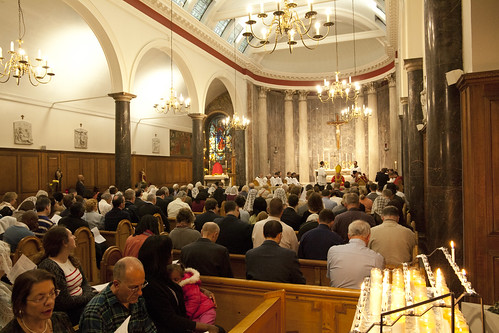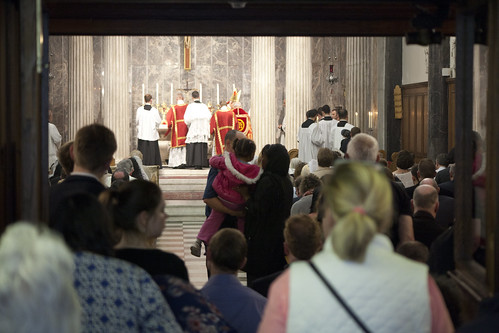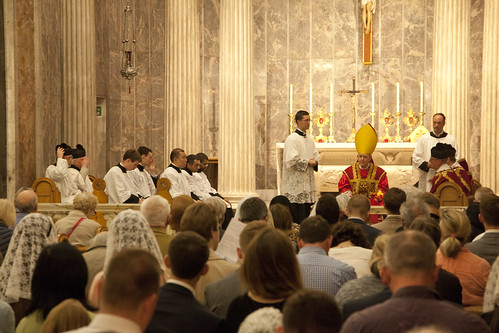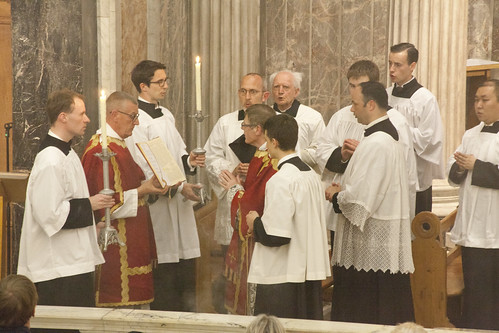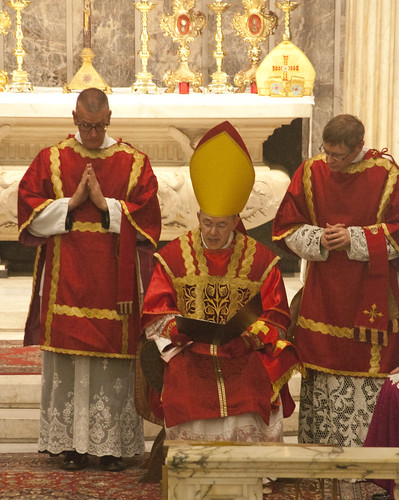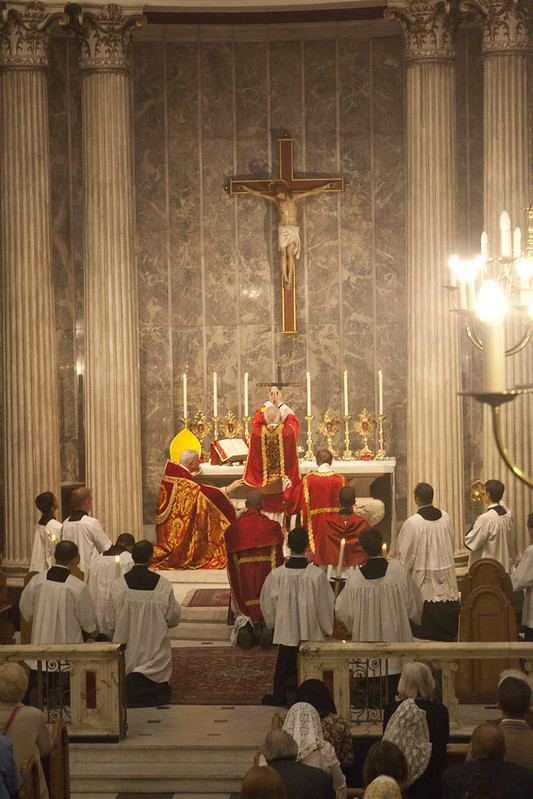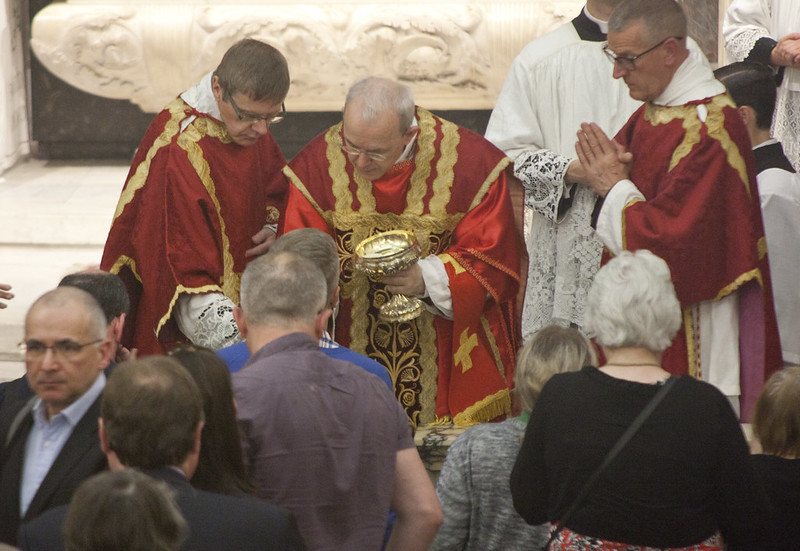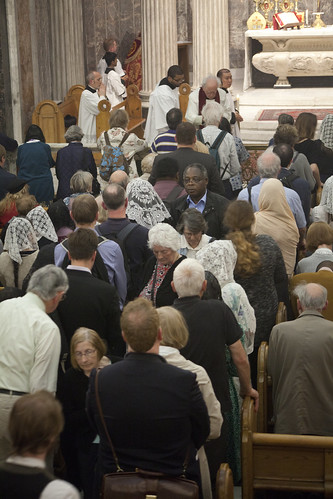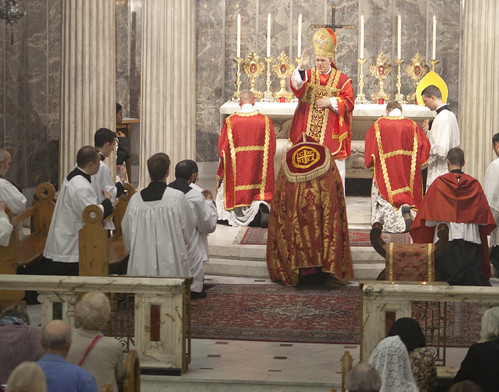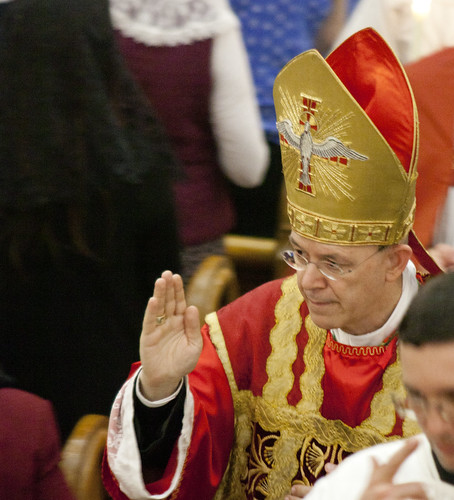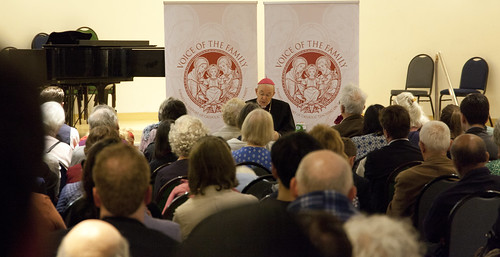Chairman's Blog
Can the Church forget doctrine?
| Drinking the mythical waters of forgetfulness in the underworld: Lethe. |
Reposted from October 2015
-----------------------------------------
At certain periods of history, one doctrine has been pushed to the fore either because it was needed to combat an issue of the day, because of its connection with a popular devotion, or because it was denied by heretics. Others have been pushed into the background. Being human, we can't focus on everything at once.
But there is something else, which is a doctrine disappearing from view because, although attacked by heretics, too many otherwise orthodox people are reluctant to defend and expound it. When these doctrines, and opinions which don't perhaps pertain to the Deposit of Faith but which are very authoritative, are mentioned, it can be a bit of a shock.
In researching the Position Paper on the Vulgate, I found a reference in a somewhat obscure official document published in 1994 to the ancient Greek translation of the Bible, the Septuagint, being made 'under divine inspiration'. I nearly fell off my chair. This is not, strictly, a teaching of the Church, but it is a pious opinion with considerable authority, taught particularly by the Greek Fathers of the Church. If it is taken seriously, then the policy of the Church since the 1940s to replace the ancient Latin translation of the Psalms, based on the Greek version, with new Latin and vernacular translations taken from the Hebrew, is fundamentally misguided.
Come back, 'valley of tears', valle lacrimarum: all is forgiven! You won't find that phrase in the reformed Office, the Novus Ordo Missal, or even the Knox translation of the Bible, when you look at Psalm 83.7 [84.6]. It is there in the Vulgate, and in the Greek, and in the ancient Gregorian chants: and, the Church is telling us, God wanted it there.
The policy of the Church, implemented through official organs of the Church like reforming commissions set up by Popes, Popes who then promulgated the results, runs counter to the belief of the Church. Looking more closely, this belief was even supported by Vatican II, but no matter: the policy trundled on, undisturbed.
This is an example which doesn't generate the heat of current debates about the indissolubly of marriage, and for this reason it can more easily help us, calmly, to consider what is and is not possible in the Church. There has been no official denial of the value of the Septuagint, though you'd be forgiven for thinking that such a denial was implied by the repeated efforts to strip its glosses on the Psalms out of the Church's spiritual life. One might call it a denial 'in practice', but clearly that isn't enough: we should not take our cue from policies, which go back a mere 70 years, especially when, every now and then, the contrary belief is reiterated in an official document. Looking at the tradition, over a much longer period, we see a very different policy, and it is that policy, the historic, traditional, policy, which represents the real practical outworking of the belief of the Church. It is this we can call the 'wisdom of the Church'.
Here's another example, with different characteristics. The Church has always taught that usury is wrong. The condemnation has been repeated in authoritative documents over many, many centuries, and the teaching derives from Scripture. We haven't, however, heard anything about this matter for a century or two, except from the odd popular writer. It could form the basis of an effective critique of capitalism, but the effort has never been made. The words 'usury' and 'usurious' occur once each in Leo XIII's Rerum Novarum (1891), and with no explanation. Things are so bad with this that the technical distinctions between different kinds of money-lending / investment upon which the doctrine is based are understood by almost no one. (There is an excellent explanation of it here.) Stray references to usury in magisterial documents never say that it is permissible after all; they just don't make use of the teaching. It has been forgotten, and of course that means it doesn't influence any practical initiatives involving finance the Church undertakes.
There are other examples. The doctrine of no salvation outside the Church would be one. Never mind the importance of understanding it correctly blah blah blah - all doctrines have to be understood correctly. But there is no understanding of this teaching, correct or not correct, which visibly makes any practical impact on the preaching or practice of the Church today, and it is many, many decades since it was even discussed in official documents. Many practical policies, arguably, actually run counter to this teaching. The same can be said of the teaching that husbands are the head of their households. Aside from Bishop Olmstead's recent Pastoral Letter, down the memory hole it goes. Again, while Original Sin still has vocal defenders, for much of the Church, and for the policies of official organs of the Church, it has vanished from sight. Practical life, notably in education, carries on as if it were not true.
These things are still the teaching of the Church; denial of them is still a serious matter which cuts us off from the Church. To repeat, forgetfulness, and official policies running counter to the teachings, do not imply that they aren't teachings any more. The teaching of the Church cannot contradict itself. What has been taught in Scripture and the Fathers and General Councils and the Ordinary Magisterium cannot be unsaid.
This doctrinal amnesia is not, I would say, a typical situation in the history of the Church. Emphasis and de-emphasis on teachings is typical; controversy is typical; sin is typical; but this is something else. It illustrates a dogmatic crisis which has been getting up steam over recent centuries, and of which we are the heirs. I would go so far as to say that it fulfils the implied prophecy in Our Lord's words.
For he that shall be ashamed of me, and of my words, in this adulterous and sinful generation: the Son of man also will be ashamed of him, when he shall come in the glory of his Father with the holy angels.
(Mark 8:38)
Could this forgetfulness encompass the Church's unchangeable teaching on the indissolubly of marriage?
Of course it could.
Support the work of the LMS by becoming an 'Anniversary Supporter'.
Loftus, farewell
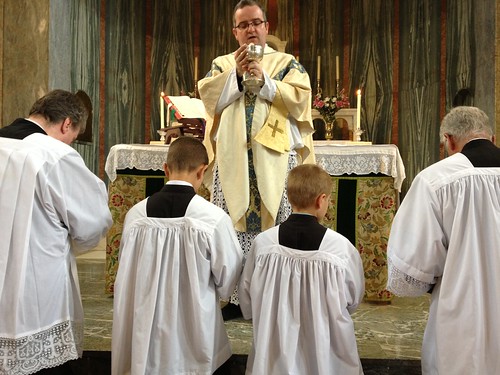 |
| Fr Nicholas Schofield celebrating the EF in his church of Our Lady of Lourdes, Uxbridge, for the Chesterton Pilgrimage (an event promoting the Cause of GKC). |
I knew it had to happen one day: I would open my copy of the Catholic Times (I subscribe to all the Catholic weeklies), glance at Fr Francis Marsden's headline, turn the page to Fr Nicholas Schofield's chosen topic for the week and there, taking up most of the page under Francis Davis' regular slot, would be ... something other than Mgr Basil Loftus.
The day was today. Instead of Mgr Loftus' byline, there was a photograph of a young priest in a tree. A little odd, you might think, but the story was about sport.
I understand this is a permanent break, not a momentary pause, so it is something of significance.
Readers familiar with the names above - Fr Marsden, Fr Schofield, Francis Davis - will know that these are terrific, orthodox Catholic writers. Furthermore, Fr Schofield celebrates the Traditional Mass in his parish. Mgr Loftus actually used his column to attack Fr Marsden's column by name. And there are more good writers, in the Catholic Times. The permanent presence of Mgr Loftus cast a shadow over the paper which has now lifted. I wish the Catholic Herald would pluck up similar courage to cut its ties with regular writers who, like Loftus, seem to be left over from a former, darker, era.
The Catholic Times is shortly re-launching as a tabloid. I never thought I'd say this, but I think it deserves our support.
It so happens (perhaps not by chance) that Loftus' very last column was quite a nasty attack on those attached to the Traditional Mass, and I wrote a letter in response, something I've not felt motivated to do for a long time. It's not published this week, and I don't suppose it will be now, the moment has passed, but for the record I post it below. I'm not going to spend ages copying out chunks of his column to prove I've not misrepresented him; I just leave it here as a reminder of the problem Loftus represented.
Happy feast of the Sacred Heart to all my readers!
 |
| O Jesus meek and humble of heart Make my heart like unto Thine. |
Sir,
Mgr Basil Loftus (1st June) writes that differences of liturgy imply differences of belief, and that resistance to change is ‘to fly in the face of the Holy Spirit.’
This may sometimes be the case, but he would do well to refresh his memory of the principles set out by the Second Vatican Council: ‘Even in the liturgy, the Church has no wish to impose a rigid uniformity’ (Sacrosanctum Concilium 37) and ‘let all… enjoy a proper freedom, … in their different liturgical rites... they will be giving ever better expression to the authentic catholicity and apostolicity of the Church’(Unitatis redintegratio 4) Pope St John Paul II declared that a ‘genuine plurality of forms’ is ‘the Church’s ideal’ (Orientale Lumen 2).
It is worth pondering the last point: that the universality, the Catholicity, of the Church is not weakened, but manifested and strengthened by liturgical pluralism, and, yes, by the fidelity to tradition common to the Eastern Churches and to those, in the West, who preserve the ‘treasure’ of the ancient Latin Mass.
Yours sincerely,
Joseph Shaw
Chairman, Latin Mass Society
Support the work of the LMS by becoming an 'Anniversary Supporter'.
Masses of Reparation in Oxford and London
I'm happy to announce not only a Mass pro remissione peccatorum (for the remission of sins) in Oxford, but also one in London.
Support the work of the LMS by becoming an 'Anniversary Supporter'.
Anyone know the late John Arnell?
See the full story.
'Desperately' is not quite the word I'd have chosen, but we really would like to give any friends and acquaintances the chance to attend a Requiem for him in the most appropriate location possible, and it would be really nice to know something about him. We've tried some obvious avenues without success and now we've got the story into a local paper.
The bequest he has left us is not life-transforming for the LMS, but it is really, really nice and as the story says it is the largest single bequest we have ever received. This is particularly touching since Mr Arnell was not a man of great wealth: much of the money is simply the modest flat he owned and died in. Since there are no close relations, or friends acting as executors, it behoves us to ensure he is given a proper public send-off. (We have, of course, already organised Masses to be said for his soul.) It is upsetting that we weren't notified before the solicitors dealing with the case had body cremated... but we'll do what we can.
Anyone with informtion should email info@lms.org.uk
Support the work of the LMS by becoming an 'Anniversary Supporter'.
Friday 15th June: Mass of Reparation for abortion, Oxford
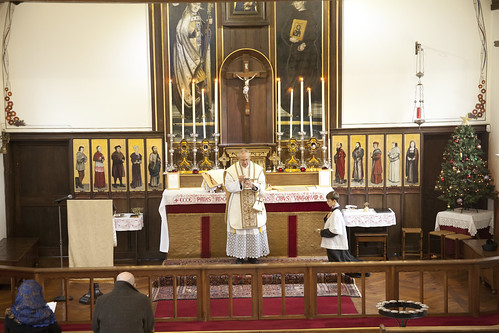 |
| Mass for the Epiphany in SS Gregory & Augustine's, Oxford |
There will be a Sung Mass in view of the Irish Referendum result:
Friday 15th June, 6pm
SS Gregory & Augustine's,
322 Woodstock Road, Oxford, OX2 7NS
(click for a map)
The Mass Sung in the Extraordinary Form, with Gregorian Chant provided by the Schola Abelis of Oxford.
It will be the Votive Mass pro remissione peccatorum: for the remission of sins. The Mass texts acknowledge our sinfulness and our need for forgiveness, our dependence on God's mercy and our confidence in His goodness.
It will be celebrated by Fr John Saward, Priest-in-Charge of St Gregory's.
The church has a car park.
Friday 25th June: Mass of Reparation in Oxford
 |
| Mass for the Epiphany in SS Gregory & Augustine's, Oxford |
There will be a Sung Mass in view of the Irish Referendum result:
Friday 25th June, 6pm
SS Gregory & Augustine's,
322 Woodstock Road, Oxford, OX2 7NS
(click for a map)
The Mass Sung in the Extraordinary Form, with Gregorian Chant provided by the Schola Abelis of Oxford.
It will be the Votive Mass pro remissione peccatorum: for the remission of sins. The Mass texts acknowledge our sinfulness and our need for forgiveness, our dependence on God's mercy and our confidence in His goodness.
It will be celebrated by Fr John Saward, Priest-in-Charge of St Gregory's.
The church has a car park.
Support the work of the LMS by becoming an 'Anniversary Supporter'.
A pro-life appeal: Making the best use of our misfortunes
The best use we can make of a hideous, painful, and morally outrageous event like the Irish referendum result is repentance. Private repentance is always positive, but I would myself like to do something with a public manifestation, and to do this in collaboration with others, if anyone is interested.
It is a truism to say that penance is undervalued in the Church today. There is something amiss when one sees in the texts of the liturgy references to 'our fasts' and 'our mortifications' on days when no fasting or mortification is any longer required by the Church: this was the case on Saturday, the Ember Saturday of Pentecost. It is not just a matter of the dramatic cutting back on fast days since Vatican II, and not even the excision of references to sin and penance in the Novus Ordo, however: the problem goes further back, and penetrates the Church more deeply.
In any case, without changing the discipline of the Church (which I can't do) I would like to encourage priests to use the options which exist to express the Church's penitential imperative. For example, as the Latin Mass Society's Ordinary Prayers of the Traditional Mass notes, in Benediction the pre-Conciliar books permit and encourage the invocation 'Parce Domine' after the Collect 'Deus qui nobis' ('O God, who in this wonderful Sacrament...'), before the Benediction itself. You can say, three times:
Parce, Domine, parce populo tuo, et ne in aeternum irascaris nobis
or in English:
Spare, O Lord, spare thy people, and be not angry with them for ever.
Or sing it:
In addition to this, and for laity as well as priests, I have an idea, or the seed of one, for which I'd like to test wider support, of organising two (sung, traditional) public Masses a year in reparation for abortion and other manifestations of the culture of death.
One would be a Votive Mass of Our Lady of Guadalupe, which is celebrated in the USA on December 12th (and for that reason can be celebrated anywhere as a Votive Mass). Our Lady of Guadalupe, who is Patron of the Americas, has very appropriately been adopted by the Pro-Life movement as her miraculous image is of her during her pregnancy. I would ask for this to be celebrated on or close to her feast day.
The other would be a Votive Mass pro remissione peccatorum ('for the forgiveness of sins'), one of the Votive Masses found in the 1960 Missal. To give a flavour of the texts, the Gospel of this Mass is Luke 11:9-13, 'Ask and you shall receive'; the Gradual is Ps 78: 9-10: 'O Lord, forgive us our sins: Lest they should say among the Gentiles: Where is their God?' I would aim to have this celebrated at the other end of the year, in June: so, quite soon.
As the Representative of the Latin Mass Society in Oxford area, and the manager of a chant schola, it is a fairly simple matter for me to ask one of our many excellent priest supporters in the area to celebrate these Masses, to arrange chant accompaniment, and to advertise it locally. The cost would be minimal. However, if there is real support these Masses could be celebrated with more solemnity, with solemn ceremonies, with polyphony, in London, or in multiple locations.
Each celebration of Mass has infinite intrinsic value. This means that two Masses do not have greater value than one. The reason we have multiple Masses celebrated for an intention is because in addition to the intrinsic value of the Sacrifice of Calvary which is re-presented in the Mass, there is the 'extrinsic' value of a Mass, the value of its prayers and the prayers of those who attend it. It is in this sense that we say that a Mass celebrated with reverence is better than one with abuses; a Mass celebrated with greater solemnity is better, in this sense, than one with less; many Masses, involving many different people, are better than just one.
The principle reason for suggesting two Masses a year for this intention is to keep the cause in our minds, our hearts, and our prayers. I know lots of people do lots of things with this purpose: in England an outstanding example is the Rosary Crusade of Reparation in London, a procession from Westminster Cathedral to the London Oratory. I would like to add to these existing initiatives something which represents the specific contribution the Traditional movement, and the network represented by the Latin Mass Society, can make.
I'll make a start with this idea locally and quietly but if there is wider support I'll make more of it in the ways I noted. In particular, if Masses are to be said with professional choirs financial contributions will be needed, and if they are to be said in additional places, more people will have to take on the organising.
If you'd like to help email info@lms.org.uk with 'FAO Joseph Shaw' in the subject line.
Photos: Whit Saturday Mass celebrated in Holy Rood, Oxford, by Fr Daniel Lloyd, with Solemn ceremonies and in the 'long form', i.e. the full set of readings specific to this day. It was accompanied by the Schola Abelis of Oxford with chant.
Support the work of the LMS by becoming an 'Anniversary Supporter'.
Ireland turns to Moloch
John Stuart Mill wrote that the freedom of a liberal state should be considered as the freedom to do anything which does not harm others. The doctrine sounds reasonable until you realise that the people who profess to live by it manipulate the term 'harm' in such a way that whatever they don't like counts as harmful, and whatever they do like does not count as harmful. The doctrine of the modern world, which Mill was attempting to put into respectable dress, is that in order to be free, in order to enjoy life properly, one must be able to inflict indescribable suffering and even death on others. To be free one must be able to abandon one's spouse and walk out on one's children; one does not need the right to quote the Bible in a street conversation, or wear a religious habit on the beach. Calling a person by a grammatically correct pronoun is a harm; killing an unborn baby is not a harm.
This may seem confusing but it makes sense really: there is a pattern. The things you are able to do, and indeed must be able to do, are the things necessary for a group of highly specific lifestyles. The things you are not allowed to do are the things which impede or complicate those same lifestyles. It is not that the favoured lifestyles are happy ones: studies of objective life-outcomes like mental health and suicide rates may even rate them poorly compared with alternatives not so beloved of our political elite. This does not prevent this conception of freedom from condemning actions which might facilitate a person's move from the former to the latter. For what is true at the individual level, that freedom consists in being able to harm others, is true at the social leval as well. A free society, on this view, is a society which harms whole groups of people: a society which insists that they remain in a state of misery. The worst thing anyone can do is to help those in a homosexual lifestyle, women in crisis pregnancies, or children who are being abused by rape gangs: any of these who actually want to be helped. No: society has decreed that they are free, that freedom demands that they follow a narrowly defined path which predictably leads to objectively catastrophic outcomes, and that they must continue to suffer until they die.
It amuses me, in a meloncholy way, to read criticisms of 'integralism', a term which is used to describe what in Political Theory is called a 'perfectionist' theory: a theory that the state should act on a view of what leads to happiness and what does not. The alternative is supposed to be a 'neutralist' theory. We are living in an integralist society, my friends; just not a Catholic one. The ways of life which are given special status in our society, which are encouraged and protected, have not been chosen on the basis of Catholic principles. They appear to have been chosen on demonic principles. They have nothing to do with what any sociological researcher would class as 'good outcomes'. They are our society's offering to Moloch of the lives of our children and young people. It is considered virtuous to make this offering; it is impiety to refuse it.
First Moloch, horrid king, besmeared with blood
Of human sacrifice and parents' tears,
Though, for the noise of drums and timbrels loud,
Their children's cries unheard, that passed through fire
To his grim idol. (link)
I have few words of comfort for the defeated pro-life campaigners in Ireland. I write before the official results have been announced, but by all accounts the margin is not such as could have been overcome by a slightly cleverer campaign strategy. I don't think they need blame themselves. They were battling something bigger than the usual political movement. Their position was an impossible one, with the self-destruction of the Catholic Church's moral authority in Ireland coupled with an international movement in favour of death.
We aren't now faced with a referendum campaign, but a lifetime to live with the consequences of the series of Molochian triumphs in Ireland, Britain, and beyond. What are we to do? We are called on to oppose injustice as best we may; to help our neighbour as best we may; to worship God as best we may. I will make only two observations about the form this must take.
One is that the big issues will not come right without a conversion of heart on the part of a large number of our fellow-citizens. Personally, I love clever arguments, but while we have to have them the heavy lifting is going to be about making an integral Catholic life seem both attractive and possible to people. Only the fullness of truth, liturgy, culture, and God's grace, is going to work here.
The other is that the work we can do for the forseeable future is going to be only preparatory and experimental. This will have its value of course, but we aren't going to make substantial progress until another condition is met: the restoration of the credibility and evangelising effectiveness of the hierarchical Church. There is very little, if anything, we can do about that as lay Catholics, or even as priests, but no Catholic movement to infuse the temporal sphere with the values of the Gospel (as Vatican II expressed it) is going to make headway without the support of the Pope and a good number of bishops. A certain proportion of ineffective or even corrupt bishops would not necessarily stop it, but a good Pope won't be effective if a vast body of bishops is against him, and good bishops can do little if the Pope is against them.
Right now it doesn't seem very likely that this condition will be met in my lifetime, but you never know.
Support the work of the LMS by becoming an 'Anniversary Supporter'.
Bishop Schneider's Mass in London: photos
St Mary Moorfields was packed to the doors last evening for Bishop Schneider's Mass. There was hardly room to stand at the back and the coridoor leading to the church from the street was occupied as well.
The sanctuary was also full to capacity. The Assistant Priest was the LMS' National Chaplain, Mgr Gordon Read, assisted by Fr Mark Elliot-Smith as Deacon, Fr David Evans as Subdeacon, and Canon Vianney Poucin de Wouilt ICKSP as Clerical MC.
Beautiful music by a number of English Catholic composers - Taverner, Tallis, and others - was sung by Cantus Magnus, directed by Matthew Schellhorn.
Bishop Schneider preached about the coming of the Holy Ghost at Pentecost at Mass, and after Mass gave a talk about the Church Militant, and the idea of Christians as soldiers of Christ. The basement of the church, where the talk took place, was similarly packed to the doors, and beyond.
Mass was offered for the Irish Referendum.
Support the work of the LMS by becoming an 'Anniversary Supporter'.
Ember Saturday Mass in Oxford
Support the work of the LMS by becoming an 'Anniversary Supporter'.



